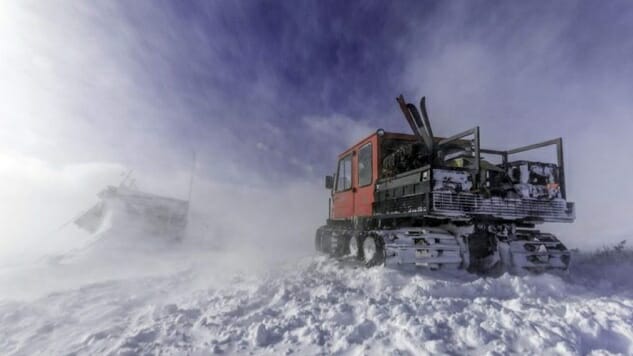Ice on Fire

I don’t remember the last time I changed my mind so many times about a documentary over the course of a single screening. First, “this is hopelessly dreary.” Then: “No, actually it’s pretty smart and quite optimistic.” “No, it’s too choppy.” “No-it’s good, even funny.” “Well… maybe not funny but…” Anyway, yes. Ice on Fire, debuting on HBO, directed by Leila Connors and produced and voiced by Leonardo DiCaprio, is an educational film about climate change and what we can still do about it. It’s especially important viewing if you think the answer is “nothing, it is too late.” But even if you don’t think that, this might refine your sense of what to do next.
Even before it gets too far along Ice on Fire reminds us of a less profound truth—not everyone who is a great actor is a great documentary curator. Leo DiCaprio may be gifted and adorable and laudable in his desire to do this project, but maybe climate science call-to-action documentary voiceover is not the highest use of his talents. Every single time he speaks, it’s distracting. The voice and delivery just don’t seem to gel with the content.
Between that and the pacing, it took me close to half an hour to get into this thing. That might have been the vicissitudes of an individual attention span, but it might have been that the film starts out in a way designed to grab attention a bit violently (fair enough)—it’s dour and gloomy and stochastic and a little hard to focus on. However, Ice on Fire hits a groove as it transitions from alarm to presenting a mosaic of optimistic, industrious folks all over the world who are working on the problem and far from convinced it’s a losing battle.
Fig and loquat and banana trees tangle around artichoke and sunflower starts in a Los Angeles urban farm, the tiny plot sequestering carbon equivalent to the emissions of seven conventional engine hatchbacks. The OG (Organic Gardener) who runs the place has a simple enough mission: Utilize the extremely direct connection between growing food and directly impacting everything from the oxygen-richness of the atmosphere to poverty, food insecurity and chronic illness. It’s not an either-or proposition: technologies that help the environment help us, and they help us by helping the environment, yes, but also in addition to helping the environment, if that makes sense. (Spoiler: It makes all the sense in the world.)
-

-

-

-

-

-

-

-

-

-

-

-

-

-

-

-

-

-

-

-

-

-

-

-

-

-

-

-

-

-

-

-

-

-

-

-

-

-

-

-








































